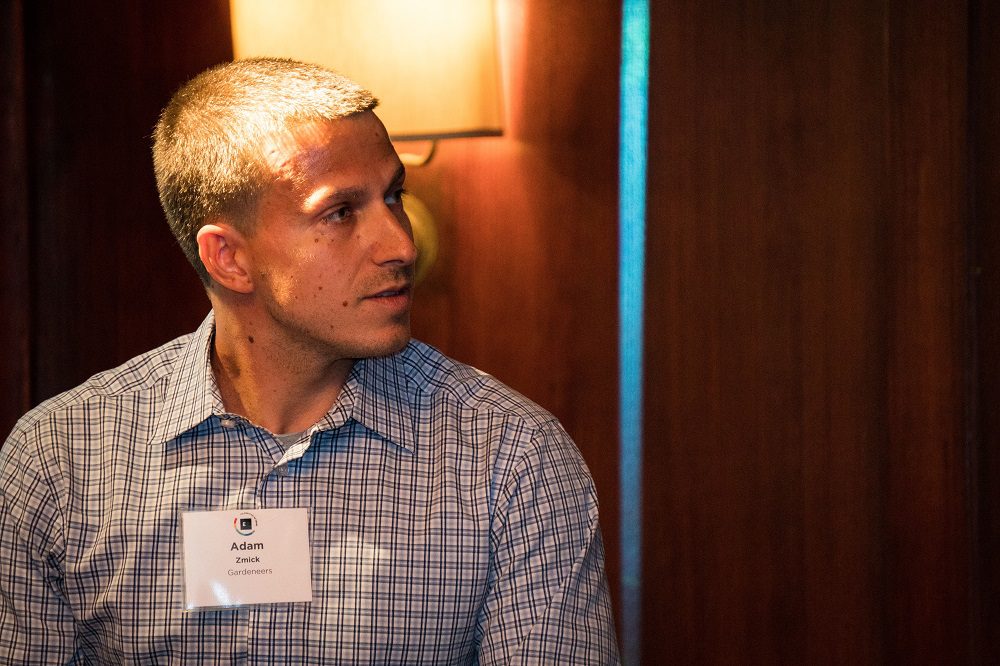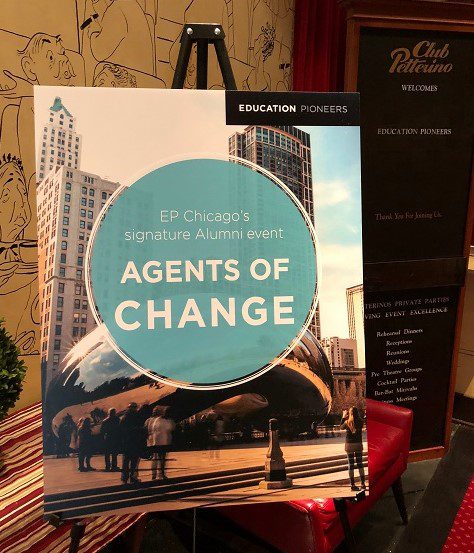
This past June, EP Chicago’s Alumni Board hosted its annual Agents of Change event spotlighting EP Alumni who work every day to ensure equity in education. As a part of the event, ONE EPic Chicago Alum is selected in honor of their work and dedication, and receives $1,000 to advance their professional development or to contribute back to their organization.
 The 2018 EPic Chicago Alum was awarded to Adam Zmick! Adam (’13) is a Chicago-land native, a Teach For America alum, and co-founded Gardeneers, which implements on-going, full-service support so every student has the opportunity to experience the multifaceted benefits of their school garden. He has an MBA from Harvard Business School and is a graduate of University of Illinois at Urbana-Champaign. Additionally, he ran the Chicago Marathon in 2016, and worked abroad in both India and South Africa prior to his 2013 EP Fellowship.
The 2018 EPic Chicago Alum was awarded to Adam Zmick! Adam (’13) is a Chicago-land native, a Teach For America alum, and co-founded Gardeneers, which implements on-going, full-service support so every student has the opportunity to experience the multifaceted benefits of their school garden. He has an MBA from Harvard Business School and is a graduate of University of Illinois at Urbana-Champaign. Additionally, he ran the Chicago Marathon in 2016, and worked abroad in both India and South Africa prior to his 2013 EP Fellowship.
Adam strongly believes that everyone deserves access to the best education — and then finds a way to contribute to that happening — and that our country and our world will be a better place when everyone can achieve to their fullest potential. He feels especially honored to have been nominated with nine of his equally successful peers, and is appreciative and thankful for all the amazing work and organizations being recognized.
Enjoy this Q&A with Adam, in honor of his award:
How has EP and your EP network impacted your work?
Gardeneers started during my EP Fellowship, as a side project. I regularly spent nights and weekends planning and researching my idea before it eventually progressed into a full-time situation. My Fellowship ended in August or September, and by March I had educators working with students in gardens, offering different levels of learning and ways to approach problems. Feedback from EP connections were incredibly helpful during that time.
And my EP connections continue to have concrete, substantial impact: a fully-funded after-school program for Gardeneers after initial connections were made, volunteer days planned by EP Fellows and Alumni in our gardens, and the ability to cross-promote initiatives in our work. I’ve also been able to send one of my own staff to EP professional development as a Visiting Fellow. I’m confident that if there’s ever a challenge that might benefit from input, my EP network can offer valuable insights into how I might choose to proceed.
How do you stay inspired as a leader?
For me, it’s young people. Every day when I see kids participating in Gardeneers programs, I’m inspired. I got to know two participants who came up through the program when they were in high school, and they’re now serving as AmeriCorps members, continuing to grow and succeed and contribute to their community. Being there for important life moments like the joy of a first paystub, seeing how much that matters to kids, and knowing Gardeneers impacts lives like that is so helpful and I don’t know where I’d be without that knowledge and that impact. Every time I interact with people who are impacted — kids, parents, teachers, community members — I’m inspired.
I also continue to see a need for this work, and am continually driven to find more resources to get Gardeneers to be in more places. It keeps me going.
Why is Gardeneers important to kids and communities?
I founded Gardeneers to help kids be healthy. In addition to gardens growing and providing nutritional food choices, access to gardens and nature is a wellness social justice issue. Wellness and nature are an important part of being human. For example, sometimes I, as an adult with plenty of resources and power to control my schedule in addition to being from a privileged background, need to go sit in a garden and just be there. And many days I can’t make that kind of 30-60 minutes happen, to benefit from that space to eat lunch, watch the insects, see flowers, feel the breeze. It’s a struggle to access a natural place like that where we can simply exist, and be happy.
Gardeneers also exists as one way to connect school and community. Volunteer garden planting days and clean up projects are a reason for parents to get involved and meet other parents and community members. To come together on a Saturday in the gardens supports the idea of a holistically healthy education system where the whole community — whether someone volunteering has kids or not — is invested in the success of the school. If Gardeneers can help foster that connection, and develop many connections across the city, we’re making an impact.
Why is data vital to your work?
Data gives us valuable feedback about our program to help determine where we need to improve. Without that information, we’d be operating blindly and remain unsure if our nutrition piece is strong or if kids feel like they’re learning. We’re still a young, adapting program, and it’s important we stay true to our mission. Data also helps us spread the word and continue to fund the program so we can reach more students. People gain interest when they hear 100% of schools want us back. It’s the hard numbers (an increase in students’ desire to eat healthy, proving that students eat more vegetables a day, improvement in school attendance after participating in Gardeneers programming, etc.) that will continue to ensure our community partnerships remain valuable and impactful for the long term.
